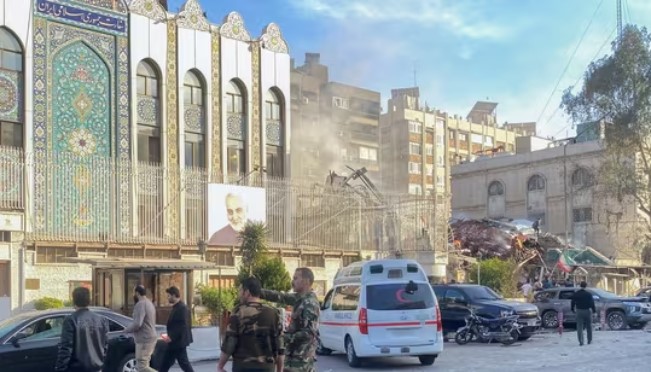In a significant turn of events in the ongoing Middle East crisis, the consular annex of Iran embassy in Damascus was destroyed by Israeli air strikes on Monday. The attack resulted in the deaths of 11 individuals, including a high-ranking Revolutionary Guard commander, further exacerbating regional tensions.
Following the attack, the Iranian officials vowed a strong retaliation, raising concerns about escalating violence amid the ongoing Gaza war.
Among those killed were Brigadier General Mohammad Reza Zahedi and another senior officer from Iran’s Islamic Revolutionary Guard Corps named Brigadier General Mohammad Hadi Haji Rahimi, described as a coordinator for the Quds Force, along with Hossein Aman Elahi, Mehdi Jalalati, Mohsen Sedaghat, Ali Aghababaee, and Ali Salehi Roozbahani. Reports indicate that the bombing was carried out by Israeli warplanes in Damascus’s Mezzeh district, prompting widespread condemnation.
Crime will not go unanswered: Hezbollah
Meanwhile, Iran-backed actors in the region have begun to react. Hezbollah, Iran’s proxy in Lebanon has issued a stern statement pledging retaliation. They warned that Israel would face consequences for the killing of high-ranking Iranian Revolutionary Guards in the strike on the country’s consulate in Damascus, Syria, the previous day.
In a statement, Hezbollah declared, “Certainly, this crime will not go unanswered, and the enemy will face punishment and revenge.” The attack on Iranian embassy and, more importantly, the killing of Zahedi has taken Hezbollah and Israel at loggerheads mounting further escalation in the conflict as the role of the slain Zahedi was deemed crucial to Hezbollah’s operations in Lebanon. He was the in charge of arming and coordinating with Hezbollah and other pro-Iranian militias in Lebanon and Syria, for a long time and for the same reason, Israel was tracking him for a long time. Reports suggest that Israel even notified the US, minutes before the attack but didn’t sought the green light.
Widespread condemnation of Iran embassy attack
According to reports the bombing was carried out by Israeli warplanes in the Mezzeh district of Damascus. The attack started a wave of criticism and condemnation. Syria’s foreign minister Faisal Mekdad condemned the bombing saying, “We strongly condemn this atrocious terrorist attack that targeted the Iranian consulate building in Damascus and killed a number of innocents.”
Saudi Arabia has also condemned the attack, labeling it a breach of international diplomatic laws and diplomatic immunity regulations. Gulf Cooperation Council Secretary-General Jasem Mohamed Al-Budaiwi also expressed strong condemnation. Saudi Arabia’s Ministry of Foreign Affairs stated, “The ministry vehemently rejects the targeting of diplomatic facilities under any pretext, as it violates international diplomatic laws and diplomatic immunity regulations.” Similar criticism has been voiced by the United Arab Emirates, Qatar, Russia, Iran, Jordan, and Oman in response to the attack.
However, Israel’s military spokesperson Rear Adm. Daniel Hagari asserted that the targeted building was not a consulate or embassy, but rather a military structure belonging to the Quds forces, disguised as a civilian facility. He highlighted a separate incident on Monday, where a drone attack on a naval base in southern Israel was directed by Iran, resulting in no injuries.
Iran’s reaction
Iran’s ambassador to Syria, Hossein Akbari, confirmed that the strike targeted a consular building within the embassy compound, emphasizing that his residence occupied the top two floors and remained unharmed. Notably, while Israel has previously targeted Iran’s military installations in Syria, this marked the first instance of an attack on its embassy. Akbari remarked, “This is perhaps the first time that the Zionist regime allows itself to attack an official building of the Islamic Republic of Iran embassy, which had the flag of the Islamic Republic raised on top of it.” Akbari pledged retaliation for the strike “at the same magnitude and harshness”.
Furthermore, Iran’s UN mission denounced the attack as a “flagrant violation of the United Nations Charter, international law, and the foundational principle of the inviolability of diplomatic and consular premises.” It reiterated Tehran’s stance, asserting its right “to take a decisive response” in light of the situation.
US denied involvement in Iran embassy airstrike
Iran alleges that the attack was executed using F-35 warplanes. Considerably, Brig. Gen. Mohammad Reza Zahedi is the most senior Islamic Revolutionary Guard Corps officer to be killed since the 2020 U.S. assassination of Qassen Soleimani in 2020. Having clear idea about the possible escalation and ramifications, the US has swiftly denied its involvement in the attack. Reportedly, a senior US official has said that US has conveyed it directly to Iran.
Nevertheless, the attack on embassy is a strategic blow and a self incriminating act by Israel. The embassies are diplomatically immune under the international law and being a state actor such an action is a direct attack on the sovereignty and integrity of another country. The possibility of an unprecedentedly heightening escalation is at the all time high in the ongoing crisis. Most importantly, the attack has given Iran an opportunity to enter the conflict directly and soon a third world war can be anticipated.

